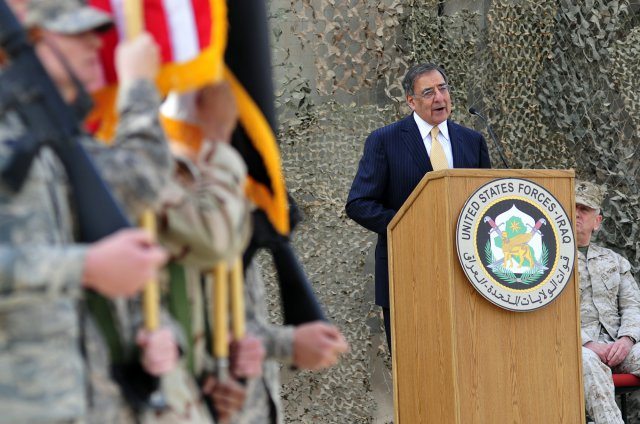The Pentagon proposed taking some 100,000 troops off active duty as the debt-ridden United States winds down a decade of war, but vowed new investments to exert power in Asia and the Middle East.
With pressure mounting to balance the US books, President Barack Obama’s administration sought a 13 percent cut in Army numbers including pulling back two brigades from Europe as well as retiring older ships and planes.
But the administration called for investment on new projects including a futuristic floating base for special operations and drones, and assigning elite Brigade Combat Teams with language training to each region of the world.
“We are at a strategic turning point after a decade of war and substantial growth in defense budgets,” Defense Secretary Leon Panetta said as he unveiled a preview of the Pentagon’s 2013 budget requests.
Panetta vowed to maintain US power in the Middle East and Asia — where China’s growing military has concerned the United States and its allies — including by modernizing submarines and funding a next-generation bomber.
Panetta called for funding to station littoral combat ships in Singapore and patrol craft in Bahrain — part of the US strategy of forward-deploying its military to strategically placed US allies.
“The force we are building will retain a decisive technological edge, leverage the lessons of recent conflicts and stay ahead of the most lethal and disruptive threats of the future,” Panetta told a news conference.
The budget is far from a done deal. Panetta is hoping to ward off calls for steeper cuts backed by some members of his Democratic Party, while Republicans seeking to defeat Obama in November elections have resisted any cuts to the military and instead prefer reductions on social benefits at home.
Senator John McCain, a Republican and staunch military supporter, said he accepted the general need to reduce spending but warned that the United States faced challenges he called “more daunting than at any time in recent memory.”
“I am deeply concerned that the size and scope of these cuts would repeat the mistakes of history and leave our forces too small to respond effectively to events that may unfold over the next few years,” McCain said.
But Miriam Pemberton, a research fellow at the left-leaning Institute for Policy Studies, said that “these are only-in-Washington cuts,” as reductions are primarily to money that the Pentagon planned for expansion.
“While powerful members of Congress will be crying that the Obama administration is gutting defense, in fact the administration has barely begun the process of reversing the buildup and shifting the money to higher priorities,” she said.
Panetta proposed a $613 billion budget for the year starting in October — a $525 billion base spending plan and $88.4 billion for combat operations, primarily in Afghanistan. The total is nine percent below the 2012 request.
He said the base budget would rise to $567 billion by the 2017 fiscal year, by which time the United States plans to withdraw most of the 90,000 troops now in Afghanistan.
He proposed reducing the number of active US Army soldiers from 570,000 in 2010 to 490,000 by 2017 and reducing the Marines’ strength from 202,000 to 182,000 over the same period.
Even with cuts, the US military budget remains far larger than those of other countries. China, which has the world’s second largest military budget, said it was devoting 601.1 billion yuan ($91.1 billion) in 2011, although many foreign experts believe that the actual figure is higher.
Among the most ambitious projects, the budget would fund work on an “afloat forward staging base” — a giant barge that can transport special operations or other forces at quick notice, reducing demands on aircraft carriers.
The Pentagon would also boost spending on cyber warfare and unmanned drones, two top US priorities amid disputes with Iran and Pakistan.
But the proposal would get rid of six of the Air Force’s 60 tactical air squadrons — meaning about 120 planes. It would retire seven cruisers and, while preserving the nuclear arsenal, delay a new Ohio nuclear submarine.
The Pentagon plans to pull out two of four brigades from Europe — for a total of more than 7,000 troops. It will also delay some of its planned purchases of top-of-the-line F-35 fighter-jets until after 2017.
In proposals that are especially sensitive, Panetta said that Obama would ask Congress to set up a commission to consider closure of military bases and reduce troops’ pay raises after two years.
The Pentagon plans total savings of $259 billion over five years. Nearly one-quarter will come through efficiencies, including streamlining civilian staff and procurement practices.










